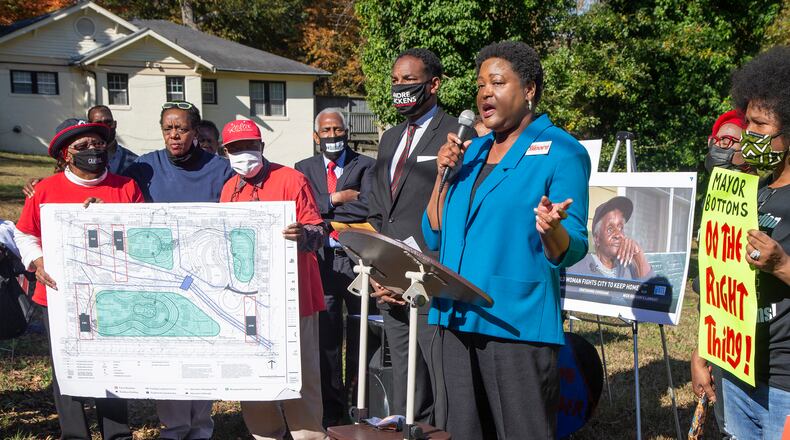An unexpected flashpoint in the Atlanta mayor’s race emerged in the final days before the Nov. 2 election, as the nearly decade-long legal fight between the city and residents in the Peoplestown neighborhood was pushed back into the political spotlight.
Parts of Peoplestown, which is located in southeast Atlanta, have been impacted by severe flooding over the years, leading the city ― initially under former Mayor Kasim Reed’s leadership — to use eminent domain to acquire houses there and build a flood prevention park across a city block. A handful of residents have refused to take a deal, fighting to stay in their homes.
The issue was reignited last month and briefly took center stage in the mayor’s race after Peoplestown resident Bertha Darden sharply criticized Reed at a mayoral forum, and a video of her remarks quickly went viral in local circles.
Activists say the city continued its effort to evict several residents just days after the forum. The day before Election Day, Peoplestown residents and housing activists protested against city leadership and Reed’s candidacy outside City Hall.
On Wednesday, that same crowd rallied and marched around their homes as they sung the Black spiritual hymn “We Shall Not Be Moved.” They demanded Atlanta halt the evictions and repeal the city ordinance that authorized the eminent domain actions.
Runoff candidates Felicia Moore and Andre Dickens have both spoken out in support of the residents over the past several weeks. But come January, one of them will fall on the opposing side of the issue when they take the helm at City Hall.
Moore and Dickens told The Atlanta Journal-Constitution they hope to find a way to keep the Peoplestown residents in their homes, while addressing the flooding that has plagued the area over the years.
The residents facing displacement said they appreciate the support. But they said actions speak louder than words, and the community plans to hold the next mayor accountable if they ignore Peoplestown.
“Don’t tell me you’re gonna do something and then once you’re out from around the cameras, it’s a whole different ballgame,” Darden said. “May the best candidate win, because we’re not endorsing nobody.”
Credit: Phil Skinner for The Atlanta Journal-Constitution
Credit: Phil Skinner for The Atlanta Journal-Constitution
Then each candidate got a turn at the mic.
“Let this eviction go away,” Dickens said. “Whoever it may be, let the next administration deal with this.”
Moore said she regretted the unanimous City Council vote that led to the eminent domain action, but that then-Mayor Reed introduced the proposal in 2014 without disclosing that residents were still living in their homes.
The legal battle only surrounds a few homes, but activists say the conflict speaks to the larger issues of displacement and the challenges Atlanta’s legacy residents face over housing.
Flood prevention plans
In 2013, the Reed administration unveiled a $66 million plan to resolve flooding in Peoplestown that included a new park and retention pond. The city council voted for the project in 2014, and most of the residents sold their homes to the city, which then demolished those properties.
But the Dardens were one of four families who refused to take a deal, spurring a legal challenge over their properties.
Credit: AJC
Credit: AJC
Dickens said the city can design the retention pond without displacing the remaining residents.
“I believe we can do that from an engineering perspective,” said Dickens, who has worked as an engineer. “We still need to do the water retention, but I think we could do it with a smaller footprint.”
Dickens, who previously sponsored an unsuccessful 2019 ordinance to reverse the eviction plan, said he will tackle the issue in his first year as mayor.
Moore also said the Peoplestown issue would be near the top of her list of priorities.
“This will not be something I carry more than 100 days into my administration,” she said. “You can never go back and take away the stress and anxiety and all of the efforts they have put in trying to stay in their homes for over a decade.”
Moore said she hopes to bring the city law department and city engineers together to “have a series of discussions and negotiations to see what can be done. At the end of the day, what I want is for them to feel that they have been made as whole as possible.”
Credit: AJC
Credit: AJC
The day before the Nov. 2 election, City Councilmembers Carla Smith and Michael Julian Bond introduced a City Council resolution expressing the city’s intent to split a $1.75 million settlement among three of the remaining families.
Reed, who finished in third place on Election Day, took partial credit for the creation of the resolution and hoped it would be approved that day. But the full council voted to send it through the normal two-week committee process, since the families hadn’t signed off on any settlement.
A spokesman for Bottoms’ office said in a statement that the administration “has negotiated in good faith with the parties and remain supportive of any efforts that get us one step closer to final resolution of this long and complicated matter.”
Tanya Washington, one of the residents remaining on the block, called the proposal “deficient” and Reed’s “Hail Mary attempt” to make the runoff, adding that she and her neighbors want their homes more than the city’s settlement money.
But she also wants the city to pay “the mountain of legal fees” the residents have accrued, and wants to see a policy enacted to prevent this from happening to other residents.
“Unlawful use of eminent domain is a crime,” Washington said. “Displacement is a crime. A lack of affordable housing is a crime, so it’s not that we shouldn’t be addressing crimes. We should be addressing all crimes.”
Keep Reading
The Latest
Featured







